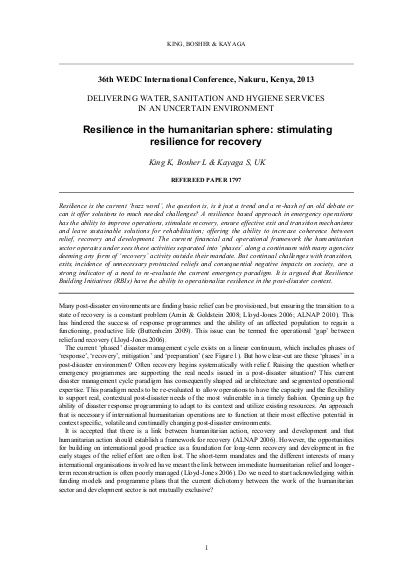Resilience in the humanitarian sphere: stimulating resilience for recovery

Resilience is the current 'buzz word', the question is, is it just a trend and a re-hash of an old debate or can it offer solutions to much needed challenges? A resilience based approach in emergency operations has the ability to improve operations, stimulate recovery, ensure effective exit and transition mechanisms and leave sustainable solutions for rehabilitation; offering the ability to increase coherence between relief, recovery and development. The current financial and operational framework the humanitarian sector operates under sees these activities seperated into 'phases' along a continuum with many agencies deeming any form of 'recovery' activity outside their mandate. But continual challenges with transition, exits, incidence of unnecessary protracted reliefs and consequential negative impacts on society, are a strong indicators of a need to re-evaluate the current emergency paradigm. It is argued that Resilience Building Initiatives (RBIs) have the ability to operationalize resilience in the post-disaster context.
Resource collections
- Evaluating humanitarian action
- Monitoring and Evaluation (M&E)
- Monitoring of humanitarian action
- UN Habitat - Urban Response Collection
- Urban Response - Urban Crisis Preparedness and Risk Reduction
- Urban Response Collection - Community Engagement and Social Cohesion
- Urban Response Collection - Economic Recovery
- Urban Response Collection - Environment and Climate Change
- Urban Response Collection - Housing, Land and Property
- Urban Response Collection - Urban Crisis Response, Recovery and Reconstruction
- Urban Response Collection - Urban Resilience
- Use of evaluation evidence